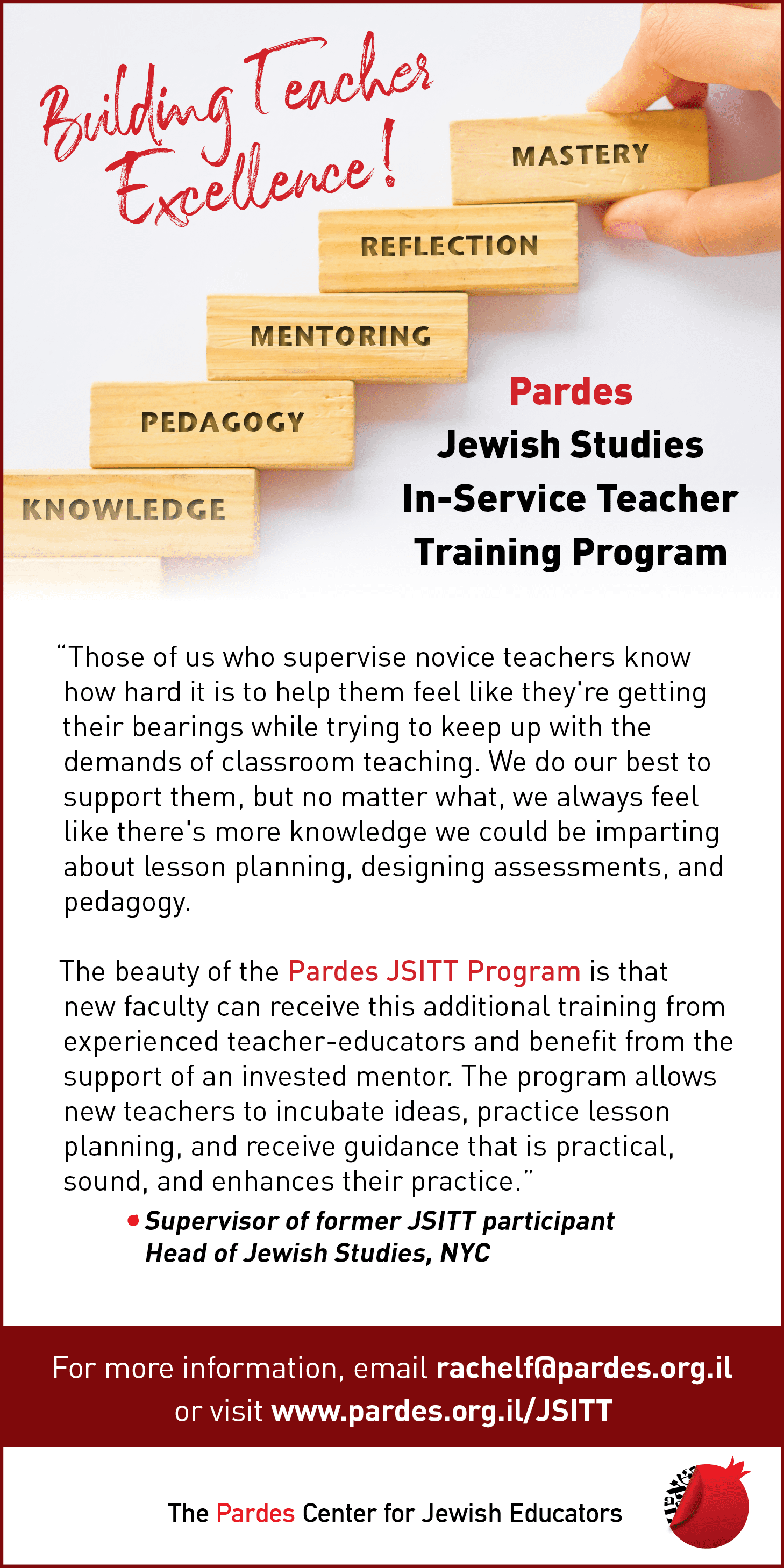Keys to Meaningful Learning Engagement & Well-being
A friend once told a story of her first year in rabbinical school. The Rabbi who was leading the class gave an assignment to work with a partner to study a section of the Torah. The student raised her hand and asked the teacher, “How far do you want us to get?” The Rabbi smiled and said, “You get as far as you get.”
The friend admitted that at first this was a struggle for her. She was used to being told exactly what to do, how far to go, in what timeframe, and then being graded accordingly. She had never experienced the concept of Torah Lishmah—learning Torah simply for the sake of learning Torah—not to receive a reward or to avoid punishment. We love this story because it shows a kind of learning that is not commonly found in schools. Very rarely are children told to “get as far as they get,” and not to worry about grades, or falling behind their peers, or meeting a standardized goal.
Researchers who study meaningful learning can appreciate the concept of Torah Lishmah. They know that when students find meaning in what they are studying—when they are truly engaged in the tasks, and not just doing them for the sake of a grade or to check off an assignment on a to-do list—they are more likely to be academically successful. In our work at Challenge Success, a non-profit school reform organization based on Denise Pope’s research at Stanford University’s Graduate School of Education, we study student engagement with learning. Our research shows that engagement is not just related to academic success, but that it is also related to student well-being. It turns out that schools that prioritize both student well-being and engagement with learning help to support students’ academic success as well as foster vital skills such as collaboration, critical thinking, and resilience. In short, the rabbis were definitely on to something many years ago!
Like the rabbinical student who wasn’t used to learning for learning’s sake, students in schools today often feel like they can’t meaningfully engage with the material. They often find themselves stressed about schoolwork, exhausted and overwhelmed by the load, and having to do whatever it takes to get the grades and test scores they believe will lead to future success. They feel the need to skim the history chapter in order to answer all the questions on the homework worksheet; they need to memorize myriad facts and equations to pass the quizzes and tests that they have each week; they need to sacrifice sleep to stay up and study; they need to please their parents and teachers by getting top grades to get into top high schools and colleges. In fact, many students and educators believe that student well-being and academic engagement are mutually exclusive; there’s just too much work to do and too little time to dive deep into the learning. However, research shows that engagement and well-being are actually mutually reinforcing and are keys to a meaningful educational experience.
We often tell the schools we work with that it doesn’t matter whether you start with student well-being or engagement with learning; by focusing on one, you will be supporting the other. Challenge Success has surveyed over 250,000 middle and high school students to understand their perceptions of their physical and mental health and academic engagement. The data shows that when kids are fully engaged with learning, they are more likely to be physically and mentally healthy. And, kids who are physically and mentally healthy are also more fully engaged in school. Now that we are teaching kids during a worldwide pandemic, well-being and engagement with learning seem more important than ever.
In this article, we share insights from over 60,000 high school students who took our survey between September 2019 and December 2020, and we offer practical strategies that schools can implement to support healthy and engaged students of all ages.
Student Engagement
In our survey, we look at the affective, behavioral, and cognitive dimensions of student engagement, otherwise known in the research world as the ABC’s of engagement. The affective scale evaluates students’ levels of interest in and enjoyment of schoolwork. Students are asked, for example, “how often do you find your schoolwork interesting?” and “how often do you enjoy your schoolwork?” The behavioral scale relates to effort, hard work, mental exertion, and the completion of assignments. Sample questions include: “How often do you try as hard as you can in school?” and “How often do you pay attention in your classes?” The cognitive scale measures students’ attitudes towards their schoolwork, its value and importance. For example, students are asked, “How often do you think your schoolwork helps you to deepen your understanding or improve your skills?”
Students who reported that they are “never” or “rarely” affectively, behaviorally, or cognitively engaged (on average) are among the 10% of our sample that are considered “disengaged.” Students who reported that they are “almost always” or “always” affectively, behaviorally, and cognitively engaged are part of the 14% of our sample that are “fully engaged.” The highest percentage of students in our sample (47%) report that they are “almost always” or “always” behaviorally engaged but “never” or “rarely” cognitively and affectively engaged; we call this profile “doing school.” And the students who reported “almost always” or “always” being behaviorally and cognitively engaged in school but “never” or “rarely” affectively engaged—25% of our sample—are known as “purposefully engaged.” (The remaining 4% don’t fit into any of these categories). Ideally, schools are working to move more students into the “fully engaged” group.
Stress Related to Schoolwork
We also ask students to weigh in on their stress levels in our surveys as one way to assess well-being. On a scale from “never” (1) to “always” (5), we ask students how often they feel stressed by their schoolwork. The average amount of stress they reported is 4.0 which reflects that, on average, students surveyed often experienced stress related to their schoolwork. When we look at this measure by student engagement-type, we find that students who are “doing school” are also more likely to report above the sample average (4.2) stress from schoolwork, whereas those who are fully engaged in school report lower, on average, stress from schoolwork (3.6).
Physical Health Problems
Another proxy for well-being is students’ reporting of physical health problems. We know that many students miss school due to health or emotional issues, and that often these absences are related to student stress. Across all students in our sample, 31% reported that they have missed school in the past month due to stress. Students who are “fully engaged” in school are the least likely to have missed school for a stress-related reason (26%), as compared to students who reported being “disengaged” (45% missed school) and “doing school” (38% missed school). In addition, we asked students to report whether they had or had not experienced a set of stress-related physical symptoms in the week prior to the survey, including headaches, exhaustion, weight loss, weight gain, sweating, difficulty sleeping, and stomach problems. 83% of students responded that they did have at least one of these symptoms of stress in the past month because of stress. Students who reported “doing school” had the highest percentage of physical stress symptoms (87% reported at least one stress symptom) as compared to the other engagement types.
Sleep
Finally, we know that sleep is a critical part of well-being. Younger students need 9-11 hours of sleep each night, and adolescents need 8-10. In our survey, we ask students how many hours they sleep on a typical school night. Across our sample, students reported getting 6.7 hours of sleep per weeknight. When we look at hours of sleep and engagement in learning, we find that it varies by engagement type. Students who are fully engaged are also more likely to report getting more sleep (7 hours per night), whereas students who are disengaged report getting closer to 6 hours, on average per night, and those students doing school report slightly more (6.6 hours per night). Very few students get the recommended amount of sleep they need each night, which we know is related to mental health disorders such as anxiety and depression, as well as potential loss of short- and long-term memory which can affect learning.
Coping with Stress
We ask students how confident they are in their ability to cope with stress. Ten percent of students reported that they are “not at all confident,” 20% “a little confident,” 35% “somewhat confident,” 26% “quite confident,” and 9% “very confident.” When we look at those students who reported “quite” or “very confident” in their coping with stress by engagement type, we find that students who are “fully engaged” in school are more likely to report confidence in coping (54%) than both “disengaged” (31%) and “doing school” (29%) types.
Given the clear relationship between well-being and engagement, particularly in terms of stress, coping, sleep, and other physical issues, it makes sense for schools to focus on ways to further engage students and to promote policies and practices that encourage student well-being. Challenge Success developed the SPACE framework for school change that offers various reforms that schools might consider in the areas of student schedule, curriculum, assessment, school climate, and community education. These are not intended to be prescriptive. We encourage each school to examine its unique needs and circumstances and then create a site-specific plan for change. Below are several strategies from this framework that our partner schools have implemented in response to their survey results.
Strategies to Support Healthy, Engaged Students
Increase student engagement with learning by clarifying the purpose of the schoolwork. If you want students to engage cognitively with an assignment, they need to understand the purpose behind it and see that it isn’t just busywork. Be sure to explain why you are asking students to do the work, how it relates to what was already learned, and what will come next. Simply telling students that they will need to know this topic because it will be on the next test may increase certain students’ behavioral engagement, but it isn’t likely to increase their cognitive engagement.
In addition, you can elevate students’ affective and behavioral engagement by allowing them to choose which topics to write about, which projects to do, which problems to try on a worksheet, or which assessment questions to answer. Small choices (please choose 2 questions from each section to answer fully on this homework assignment) or large choices (you get to decide your next science experiment) both give students agency over their learning and allow students to study or write about something that truly interests them.
Increase student voice in the classroom or school by regularly checking in and asking students to weigh in on policies and practices. Students experience the curriculum—and the stress that may accompany it—first-hand, so they are often the best people to ask how to make school more engaging and how to change some of the practices that are impacting their well-being. Schools can use a variety of strategies to “listen in” to students such as shadow days, student fishbowls, dialogue nights, or a Challenge Success student survey.
Lower the workload without sacrificing achievement. Though we may not be able to always tell students to “get as far as they get” with their learning, we can find ways to decrease the load we assign without decreasing student understanding. Consider de-cluttering your curriculum to determine (perhaps with the students’ input) which skills and topics must be covered in depth vs. which may not be as necessary. Mapping the curriculum across grade levels and/or by department might show places where there is unnecessary repetition, and auditing your lesson plans can help ensure that students reach enduring understandings of a few critical concepts in each unit.
Lose the “gotcha” in assessments. Many students report in our surveys that high-stakes assessments and pressure to get good grades can be a source of undue stress. Try open note or open book assessments to lower students’ anxiety. In the real world, you almost never have to show what you know during a timed assessment and without access to resources such as computers and co-workers. Consider more frequent, untimed, low-stakes assessments, that serve to highlight what students know and are able to do.
Give every student a real break. There is a reason for Shabbat at the end of the work week, and yet many students spend long days and busy weekends without a real break. Some of this is due to overscheduling of extracurricular activities, but high school students in our surveys also report doing around 3 hours (2.8 on average) of homework each night, and a similar amount on the weekends. Consider reducing the number of homework assignments you give, especially over the weekend, or better yet, implement no-homework weekends and vacations to allow students a real break.
These are just a few suggestions to increase student well-being and engagement with learning, and many of you likely practice one or more of these already. By making student health and the ABC’s of engagement your primary focus, you can fundamentally change the climate of your classroom and school and increase the likelihood that students will have meaningful learning experiences that last long after they take the test or turn in the paper.

Denise Pope and Sarah Miles
Sarah Miles, M.S.W., Ph.D., is the Director of Research and Programs for Challenge Success. She oversees the organization’s research and program teams, leads research efforts on how schools and classrooms can best support student learning and engagement, and partners with Challenge Success member schools to translate research into practice. She has served as a coach with Challenge Success member schools and worked as a teaching and research assistant at Stanford. Prior to receiving her doctoral degree, Sarah taught fifth grade in Oakland, California and worked as a clinical social worker in the Boston area.
Denise Pope, Ph.D., is a Senior Lecturer specializing in curriculum, school reform, and student engagement at the Stanford University Graduate School of Education. She is co-founder of Challenge Success, a nonprofit organization that provides schools and families the tools they need to raise healthy, motivated students, is the author of Doing School: How We Are Creating a Generation of Stressed Out, Materialistic, and Miseducated Students, and co-author of Overloaded and Underprepared: Strategies for Stronger Schools and Healthy, Successful Kids.



